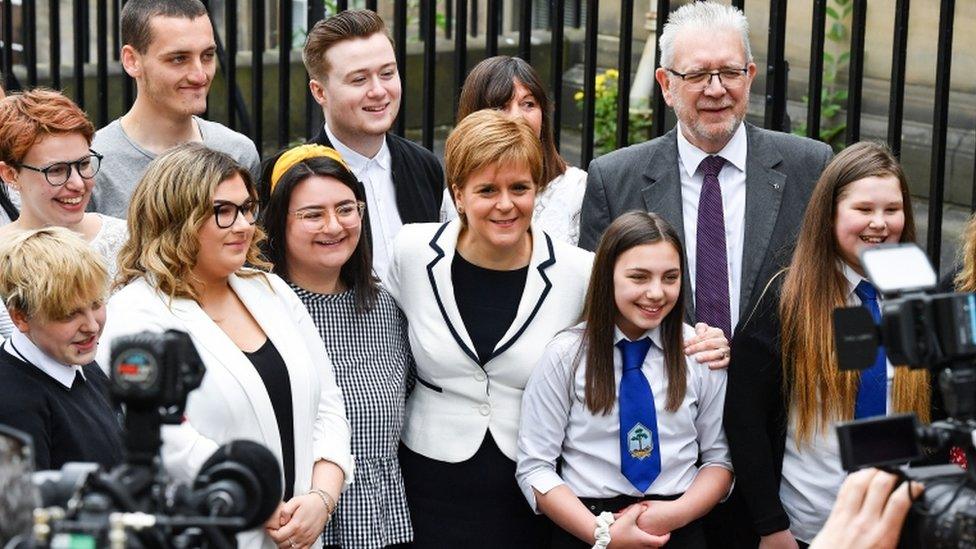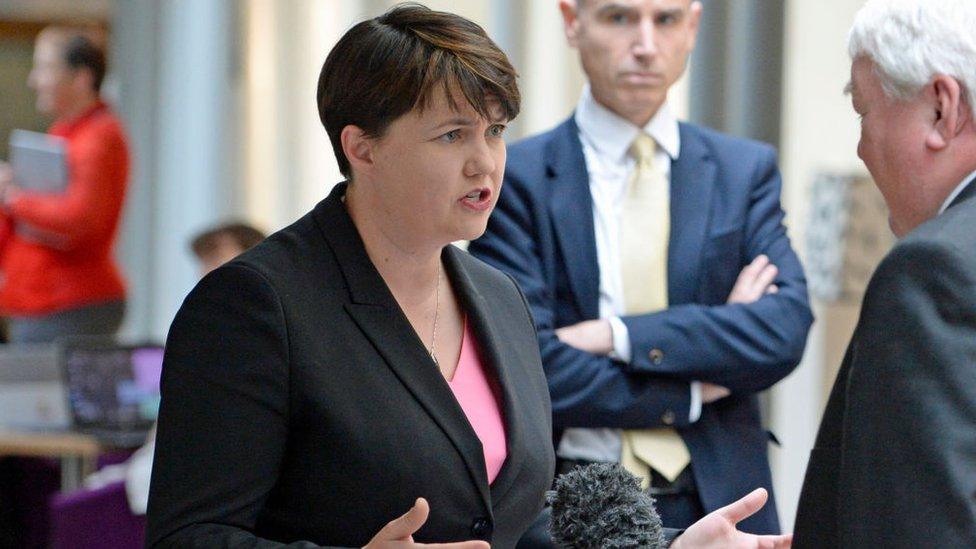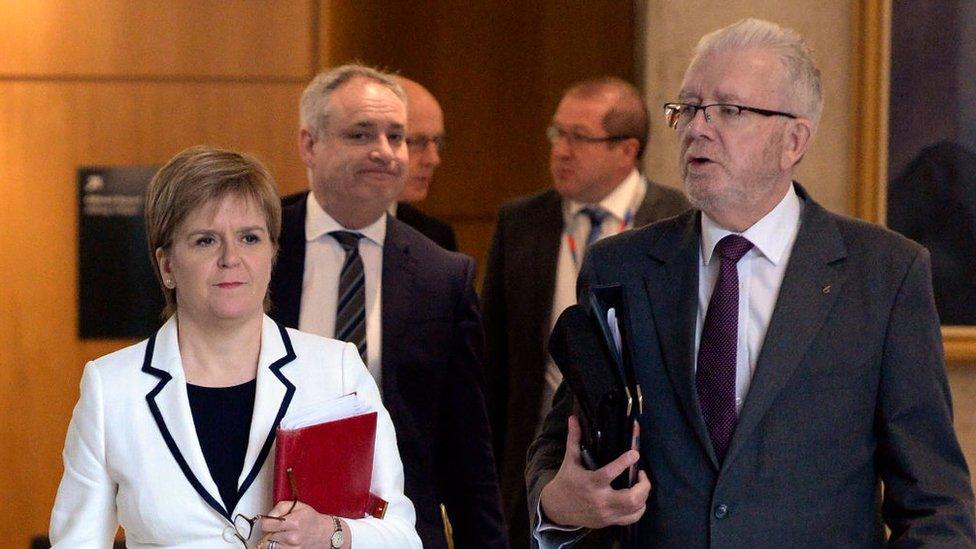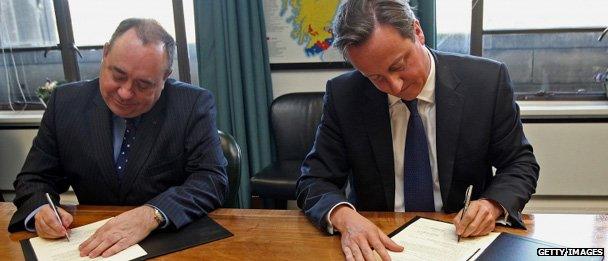Future first minister? Nicola meets Nicole
- Published

Nicola Sturgeon met a group of young people - and potentially her successor in Nicole (pictured to the right of her)
Ah, the certainty of youth. Today, Nicola met Nicole and encountered, once again, the confidence occasionally exuded by those whose experience of life is charmingly limited.
Nicola is, of course, the first minister, who was publicising her new Referendums Bill by chatting with the younger generation. The theme being contemplation of the future.
And Nicole? An enthusiastic teenager at an Edinburgh youth centre.
I asked Nicole what she hoped to be. The answer was instantaneous. "First Minister". Gesturing towards the incumbent, I persisted: "So you want her job?" The answer? An emphatic "yes!"
Cheerfully suppressing the latent insecurity which attends all political life, Ms Sturgeon laughed contentedly - while suggesting to her youthful chum that perhaps the hand-over might be delayed somewhat.
Incidentally, all power to the staff and youngsters at the youth centre, 6VT. They appeared to be tackling a quite bewildering range of projects with gusto and vim.
One is to prepare a book about Bessie Watson, said to be Scotland's youngest suffragette. She lived in a small dwelling at the very site where 6VT is now based.
Her story is a reminder of change; of fundamental constitutional reform but also of the change brought about by time.
In comparable fashion, Nicola Sturgeon believes that the passage of time will result in an independence referendum and, subsequently, in independence.

Ruth Davidson will strenuously oppose indyref2 - and press the next UK Tory leader to follow
You will not be surprised to learn that her opponents dissent. Including, volubly, Ruth Davidson, she who leads the Scottish Tories.
Ms Davidson told me that a further referendum was the last thing Scotland needed. She would oppose it strenuously and advise any successor to Theresa May to do likewise.
It is to be expected that the soccer squad of candidates presently vying to be Conservative leader at Westminster would follow that advice.
When trying to be popular with the Conservative rank and file, they will remember that they probably need to step up the Brexit rhetoric - but that they certainly need to place no question mark over the Union that is the UK.
So does that make Ms Sturgeon's quest futile? She says no. It would be pointless, she argues, to seek to persuade the UK Government at present. It is, she argues further, dysfunctional.
But that does not mean, she continues, that she should abandon her aim of offering Scotland next year an alternative to the constitutional future determined by Brexit.

Mike Russell gave a statement at Holyrood on the government's plans
Today's bill was accompanied by a statement from Mike Russell, the Secretary for Mitigating Brexit.
He promised to continue talks with the UK government; to offer cross-party talks to other Holyrood parties about Scotland's future; and to engage the public through Citizens Assemblies.
Beyond its overt content, this package is designed to achieve two other purposes. To demonstrate the readiness of the Scottish Government to consult and debate. Folk tend to like that.
And, secondly, to provide evidence of activity to independence enthusiasts. OK, it says, we can't give you indyref2 right away - but witness our preparation. Is it not sagacious and sensible?
Questions over questions
There was another dispute over the Bill at Holyrood. Adam Tomkins of the Tories complained that it gave too much power to ministers, most notably over the potential wording of any referendum question.
The Scottish government denies that it intends to sideline the Electoral Commission in any such task. They say the Bill makes provisions for the involvement of the Commission - although they also note that the 2014 question provides "clear precedent for a simple, straightforward and understandable question."
Mr Tomkins' suspicions persist.
In response, Mr Russell kept it simple. He insisted that it would, ultimately, be up to the Scottish Parliament to determine the content of any referendum. Not, solely, ministers.
I think there may be a more elemental factor. Mr Tomkins suggests that Ms Sturgeon is preparing the ground for what he calls a "wildcat" plebiscite.

Nicola Sturgeon wants a referendum deal similar to that signed ahead of the 2014 independence vote
Must confess I see little evidence of that, at least in its fullest form. Nicola Sturgeon does not contemplate an unofficial referendum. She knows it would be open to a domestic boycott and would not attract international endorsement.
She wants, instead, a referendum on the lines of 2014, which was preceded by the Edinburgh Agreement between the UK and Scottish governments.
As was the case then, such a future deal would be conditional upon the details of a referendum being agreed. Including the question.
In any case, we are getting ahead of ourselves a little. The core issue now is - what will happen to Brexit?
Indyref2 may, or may not, arise in the next couple of years. If yes, then the people of Scotland will, once again, confront a choice.
If not, then the SNP will convert their demand for a referendum into a campaign issue at the 2021 Holyrood elections.
The auld sang has many and varied verses.
